Table of Contents
There is nothing better than picking fruit from a bush or tree and can eat it right away. Thanks to its sweetness and natural aroma, a feeling of bliss immediately spreads through your body. Okay, but what do you do when you get a craving for freshly picked strawberries or raspberries, but they’re not in season? Of course, you can buy imported fruit from the supermarket, but we can all agree that it’s not nearly as satisfying. It’s just not the same. Fortunately, we have a solution, it’s called freeze-dried (lyophilized) fruit. In today’s article, we’ll take a closer look at it.
What is freeze-dried fruit?
Lyophilized fruit is the same as freeze-dried. This process is currently considered one of the most gentle, as it helps fruit and other dried foods retain their authentic taste, flavour and nutrient content.
What is freeze-drying and how does it work with food?
Freeze-drying is a process that removes water from food to give it a dried form, thus also preserving it. There are several types, vacuum lyophilisation is considered the most gentle. It preserves most of the beneficial substances, taste and texture.
How does freeze-drying (lyophilization) work?
- With freeze-drying, you first need to get the water from the fruit into a solid state, which is ice.
- So, first of all, the temperature is lowered so that freezing occurs.
- The pressure is then reduced to allow the ice to turn to steam and sublimate.
- Next is secondary drying, when the temperature is changed and the last remnants of water are removed.
- The result is crunchy dried fruit pieces that retain their delicious taste and natural aroma. [1-2]
The whole process takes several hours and is quite energy intensive, which is reflected in the final price of the freeze-dried fruit. [7]
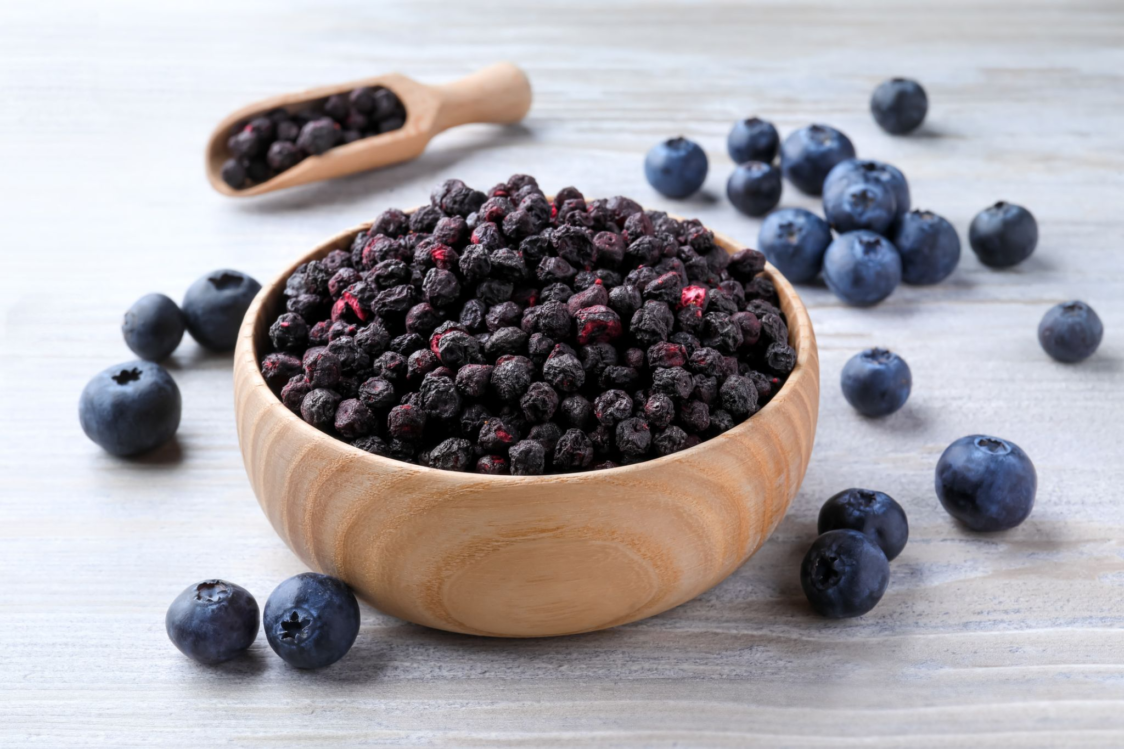
Will the fruit lose all its nutrients through freeze-drying?
Studies show that freeze-drying is as gentle as possible. Compared to hot air drying, it retains more nutrients. Researchers have even tried to find out what the difference in micronutrient content is between freeze-dried and hot air-dried fruit. In particular, they focused on sea buckthorn fruit. The results showed that the fruit retained 93% more carotenoids, 34% more vitamin C and 11% more phenolic substances (such as antioxidants) when freeze-dried compared with air-drying. While there is some loss of vitamins through lyophilization, this is not unusual or unnatural. Similarly, fruit that is stored for longer periods of time loses its micronutrients. There is therefore no need to be concerned about the proportion of these substances. [1]
However, vitamins are not the only beneficial substances in fruits, we must not forget about phenolic compounds, which are one of the most important bioactive substances. And here we have good news for you. Studies have shown that their proportion can even be increased by freeze-drying. And it’s not just fruit. For example, in coffee, the proportion of beneficial phenolic acids increased by 41% after freeze-drying compared to fresh green coffee beans. [1]
If you want to learn more about food storage, you shouldn’t miss our article How to Store Food Properly to Last as Long as Possible.
Which foods can be freeze-dried?
However, lyophilization is far from just being about fruit. You can freeze-dry the following foods:
- vegetables
- cheese
- meat
- cereals
- some whole foods
- spices
- tea
- coffee [1]
In addition, biological material, cosmetics, pharmaceuticals and some chemicals can also be freeze-dried. It is therefore a process that is used not only in the food industry.
You might be interested in these products:
Can you dry-freeze fruit at home?
In short, yes you can. The ideal is to use a freeze-dryer that can work with temperature and pressure to achieve the best possible result. However, it is quite expensive and not a common household item. If you don’t have one at home, you’ll have to make do with frozen fruit or fruit dried in a hot air dryer or oven. However, as we said above, this process loses more of the beneficial substances in the fruit.
If you are wondering about the quality of frozen and canned fruit, you should not miss our article Is Fresh Fruit and Vegetables Healthier than Frozen or Canned?
How to store freeze-dried fruit?
Freeze-dried fruit should not be exposed to direct sunlight. Therefore, it is ideal to keep it in the pantry to avoid any change in colour, texture or other properties. Similarly, the pieces should be kept dry so that they do not absorb moisture. Therefore, store them in the pantry in a resealable container or box. [3]
What are the nutritional values of freeze-dried fruit?
In order to get a better idea of the nutritional content, let’s use strawberries as an example. [4]
Fresh strawberries
Nutritional value: 32 kcal
Fats: 0.22 g
Carbohydrates: 8 g
– of which are sugars: 5 g
Protein: 0.64 g
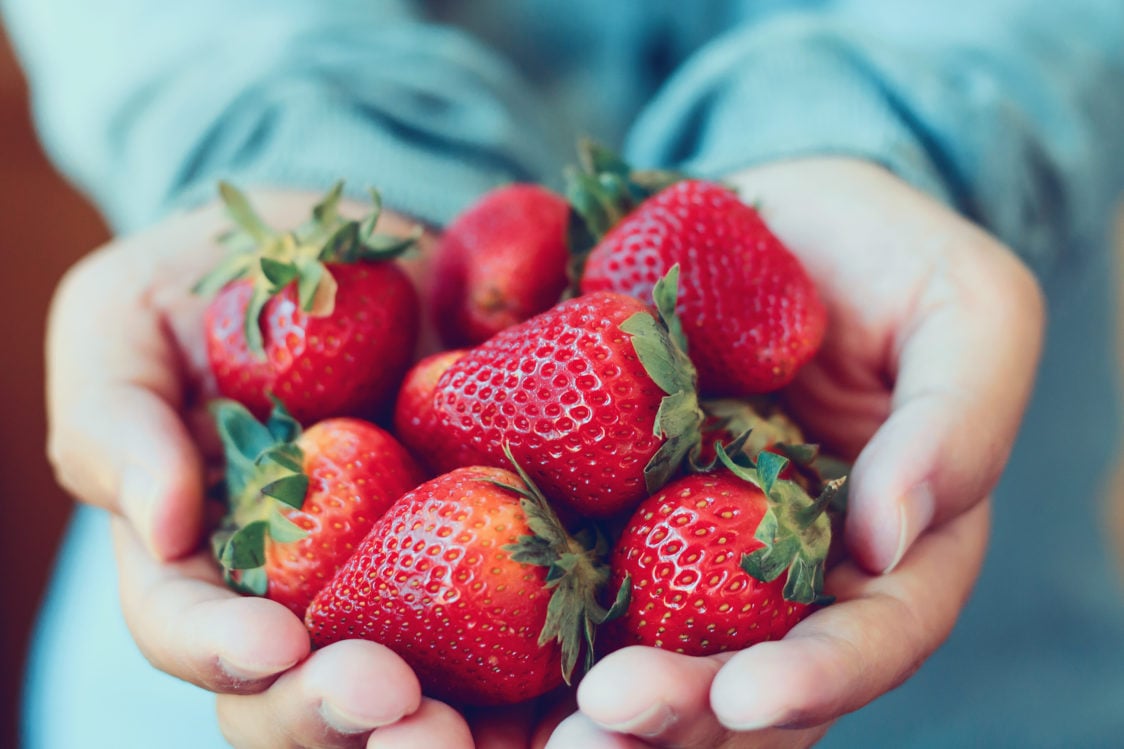
Energy value: 286 kcal
Fats: 3.7 g
Carbohydrates: 50.9 g
– of which are sugars: 50.6 g
Protein: 7.6 g
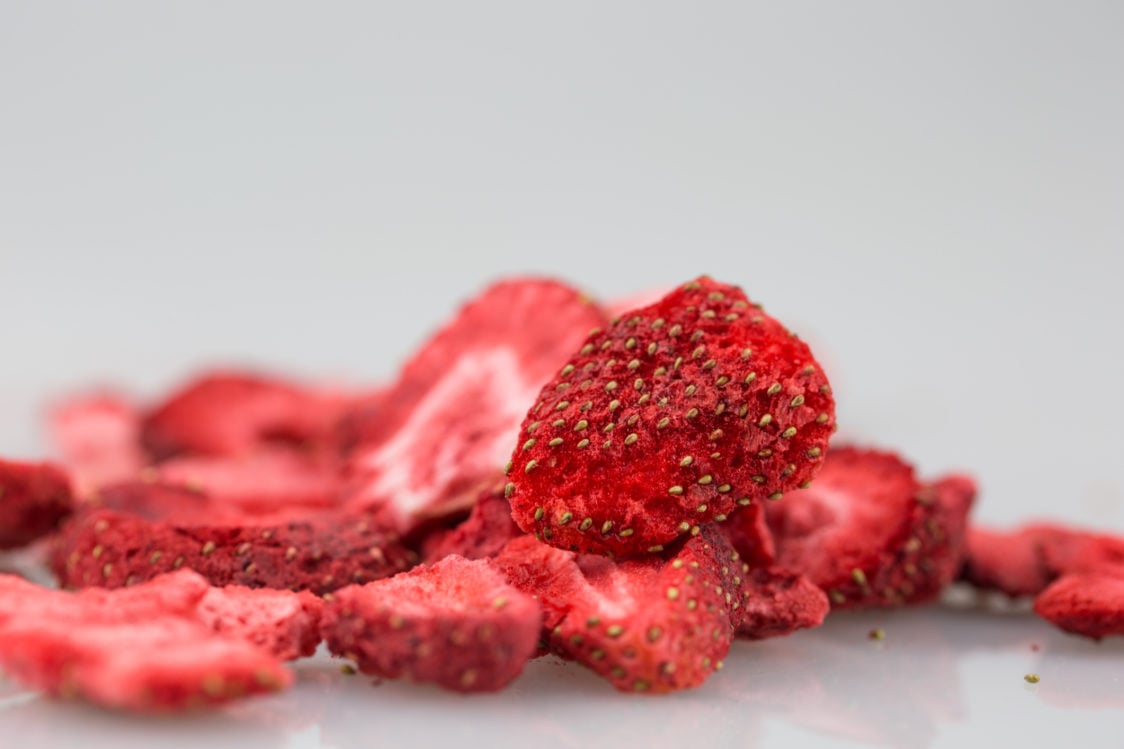
As you can see, the energy value of freeze-dried and fresh fruit differs quite substantially. However, this is not because a bunch of other ingredients have been added to freeze-dried products to increase the energy value. The explanation is much simpler. Fresh fruit contains a high proportion of water, more specifically around 90%. However, if you deprive fruit of its water, which has no calories, by freeze-drying it, it becomes a much more concentrated source of nutrients. [5]
It’s probably obvious to you that you shouldn’t eat the same amount of freeze-dried and fresh fruit. Freeze-dried fruit should be handled with a little more care and not eaten by the handful like fresh fruit. However, if you put freeze-dried fruit in water, yoghurt or other liquids, it increases its volume and is much more filling. But it loses its crunch. Therefore, you have to consider what texture you want at that moment.
Wondering how many calories each fruit has? Then you should not miss our article Fruit: How Many Calories and What Vitamins and Minerals Does It Contain?
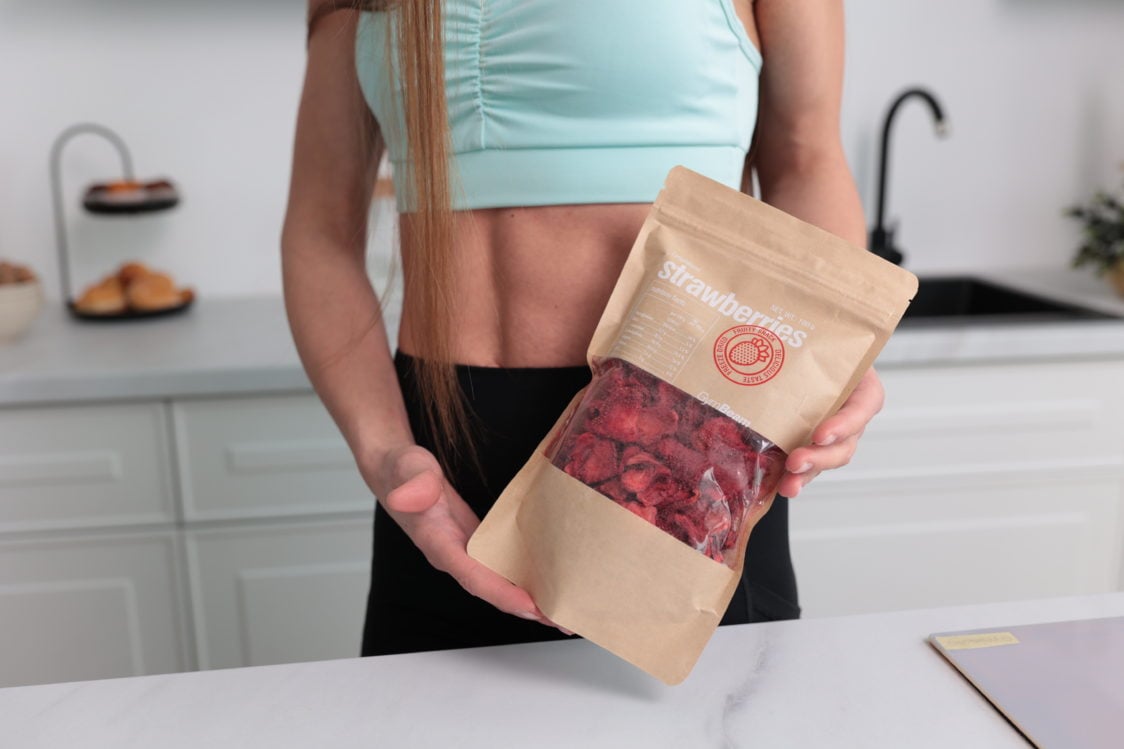
5 benefits of lyophilized fruit
The benefits of fruit lie not only in its nutrient content, as thanks to the way it is processed it boasts other benefits.
1. Smells and tastes just like fresh fruit
When you open a packet of freeze-dried fruit, you may be surprised to find that its taste and aroma rivals that of fresh fruit. Even if a dried piece of strawberry is as light as paper and you think that it has virtually no taste, the opposite is true. As soon as you put it in porridge, yoghurt or in your mouth, the fruit absorbs the necessary moisture and starts to resemble fresh fruit even more.
2. You can take it on the go
The fruit loses some of its properties due to the fact that it is deprived of water. Who has ever put a piece of fresh fruit in a backpack and when you took it out, it was an unsightly mass and the backpack was ripe for a good washing? That’s exactly what you don’t get with freeze-dried fruit. Even if pieces of freeze-dried fruit spill into your backpack, no problem, just shake them out and you’re done.
In short, freeze-dried fruit is a practical food that you can take anywhere as a snack. It is ideal for work, college or trips, when you can certainly use it as a quick source of energy. And look out, it can even be taken into space. It loses up to 90% of its water during processing, so it’s as compact as possible. That’s why freeze-dried fruit is also referred to as fruit for astronauts. So, if you want to go on a space flight, be sure to take a packet of lyophilized fruit with you.
If you’re wondering how to create a balanced snack, you shouldn’t miss our article What Should a Balanced Snack Contain and How to Replace High-Calorie Snacks in a Healthy Way?
And you can read more about tips for snacks that will give you energy during sports activity in our article What to Eat and Drink to Get Enough Energy While Hiking or Cycling?

3. It’s perfect for ganishing desserts
You don’t like the colourful pieces full of artificial colours and added sugar that are used to decorate cupcakes or Christmas candy? Then you must try substituting them with freeze-dried fruit. This not only looks great on desserts, porridges and other dishes, but also tastes better. It adds sweetness or sourness to your food, depending on which fruit you use. And let’s not forget the smell. You won’t believe that the dessert doesn’t really contain fresh fruit.
4. Has a longer shelf life
Another advantage over fresh fruit is the shelf life of freeze-dried fruit. If you bring very ripe fruit from the store or pick fresh from the garden, it may well start to rot or become mouldy the next day. There is absolutely no risk of this happening with freeze-dried fruit when stored properly. It can remain good for several months when stored in the pantry. Some manufacturers even claim that freeze-dried fruit lasts 25–30 years. However, we cannot confirm this. Given its great taste, no pack will last very long in your pantry. [6]
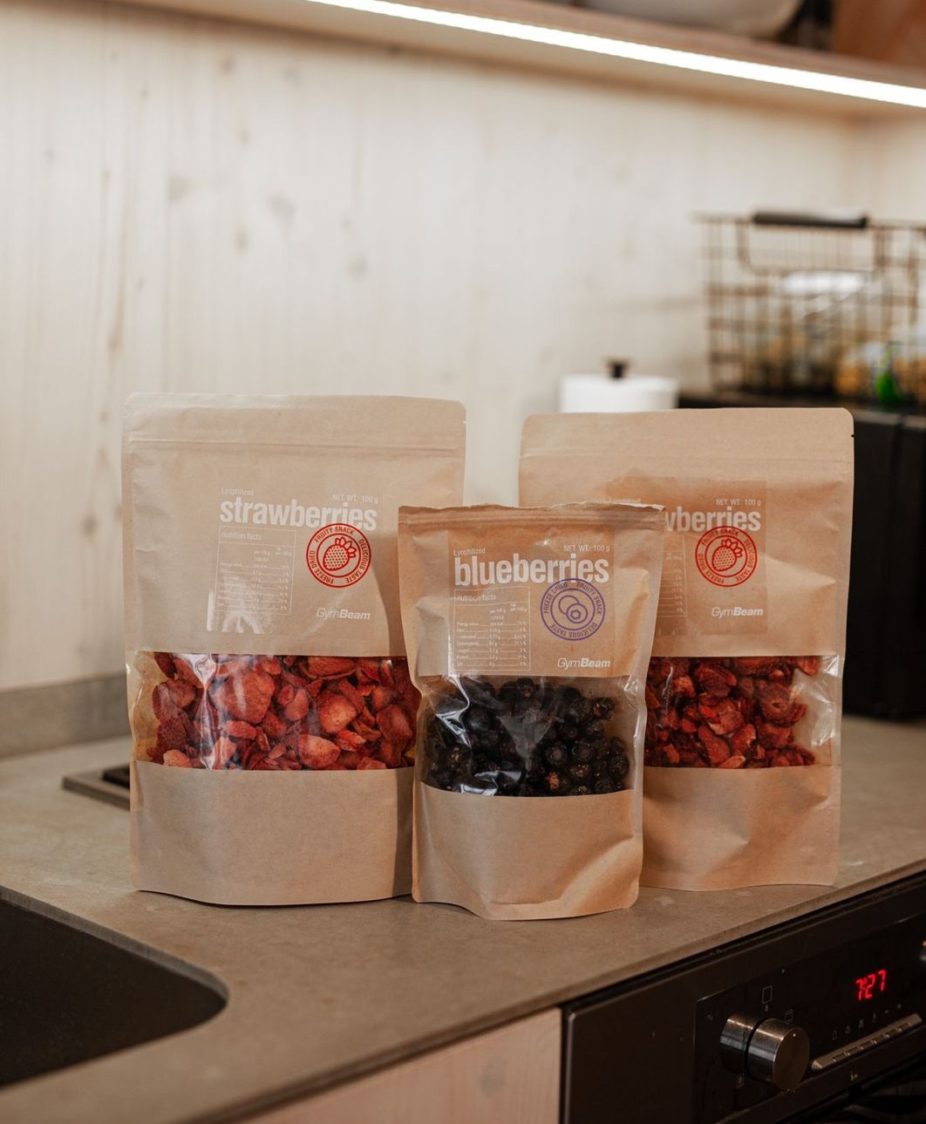
5. It is a healthier alternative to traditional sweets
Do you get cravings? Then there are plenty of alternatives to satisfy your sweet tooth. You can reach for classic sweets. But if you’d like to reduce the amount of fat and added sugar in your diet, then a handful of freeze-dried fruit is the ideal sweet snack. Depending on your taste preferences, you can reach for:
And if you feel like fruit alone won’t satisfy you, add a protein source like quark cheese or skyr and you’ve got the perfect snack that will stave off hunger. If you’re on the go, a protein bar and freeze-dried fruit is a great combination.
If you’re wondering whether you can fruit during weight loss, you shouldn’t miss our article Myths and Facts about Fruit: Does it Detoxify and Can You Eat It in the Afternoon and Evening When Losing Weight?
How can you use freeze-dried fruit?
You don’t have to just sprinkle freeze-dried fruit on porridge or eat it on its own, that would be a bit boring, wouldn’t it? It’s perfect for smoothies, drinks, making homemade ice cream, baking and other goodies. To make things easier for you, we’ve picked out some delicious recipes you can try with lyophilized fruit. Are you already drooling?
What should you remember?
Fruit should be a daily part of your diet. And if you don’t grow raspberries and strawberries in the winter, freeze-dried fruit is the best way to get that authentic taste and smell of freshly picked fruit. In the kitchen, freeze-dried fruit has just as many uses as fresh fruit. In some recipes, such as crispy biscuits, it is even better suited. And if you store it properly, there’s no risk of it going bad or spoiling quickly.
Do you know anyone who avoids dried fruit because they don’t think it’s healthy? Share our article to help them discover the hard truth.
[1] Sagar Bhatta et al. – Freeze-Drying of Plant-Based Foods – https://www.ncbi.nlm.nih.gov/pmc/articles/PMC7022747/
[2] Dorota Nowak et al. – The Freeze-Drying of Foods—The Characteristic of the Process Course and the Effect of Its Parameters on the Physical Properties of Food Materials – https://www.ncbi.nlm.nih.gov/pmc/articles/PMC7603155/
[3] What Is Freeze Dried Fruit? – https://www.thespruceeats.com/what-is-freeze-dried-fruit-5193827
[4] Strawberries, raw – https://fdc.nal.usda.gov/fdc-app.html#/food-details/2346409/nutrients
[5] Sandulachi Elisavet et al. – Water activity concept and its role in strawberries food – https://ibn.idsi.md/vizualizare_articol/22770
[6] All About Freeze Dried Fruits Shelf LIfe – https://ratinkhosh.com/freeze-dried-fruits-shelf-life/
[7] Ovoce sušené mrazem namočte. Během chvíle je jako čerstvé a plné vitamínů – https://www.vimcojim.cz/magazin/clanky/o-vyzive/Ovoce-susene-mrazem-namocte.-Behem-chvile-je-jako-cerstve-a-plne-vitaminu__s10010x19583.html

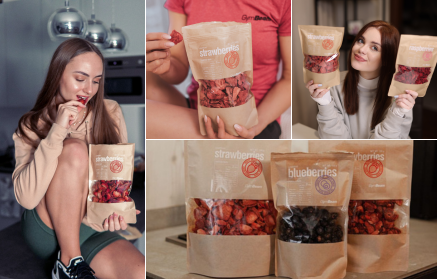


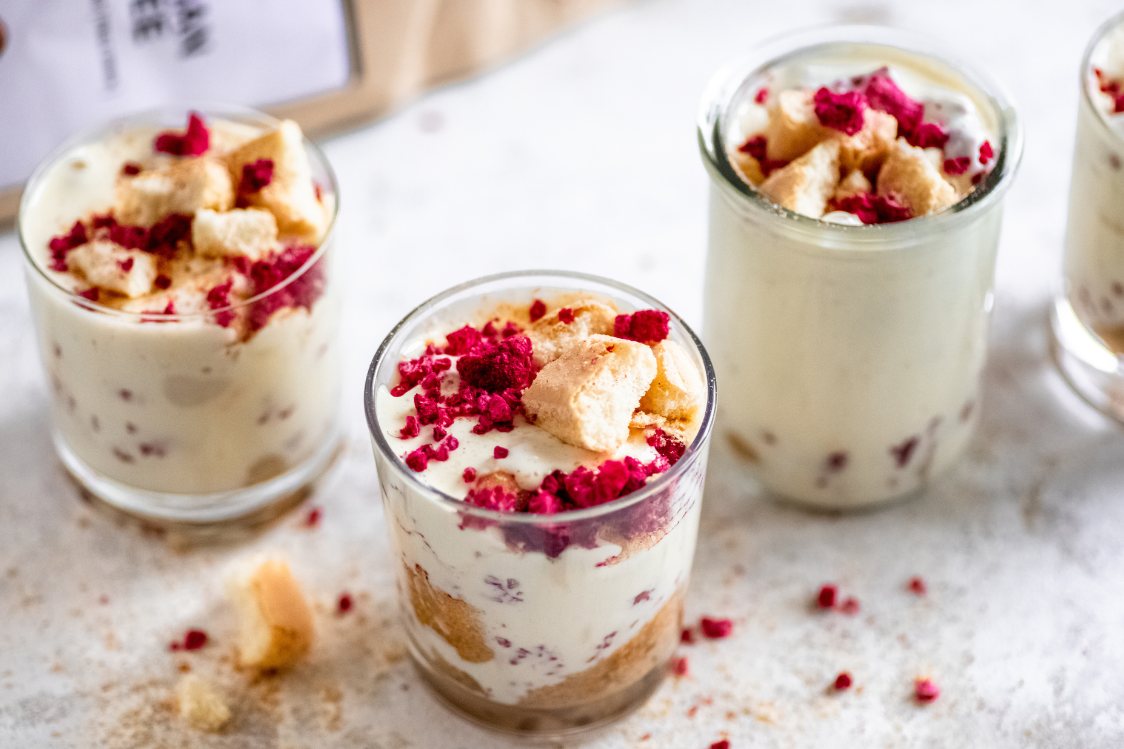

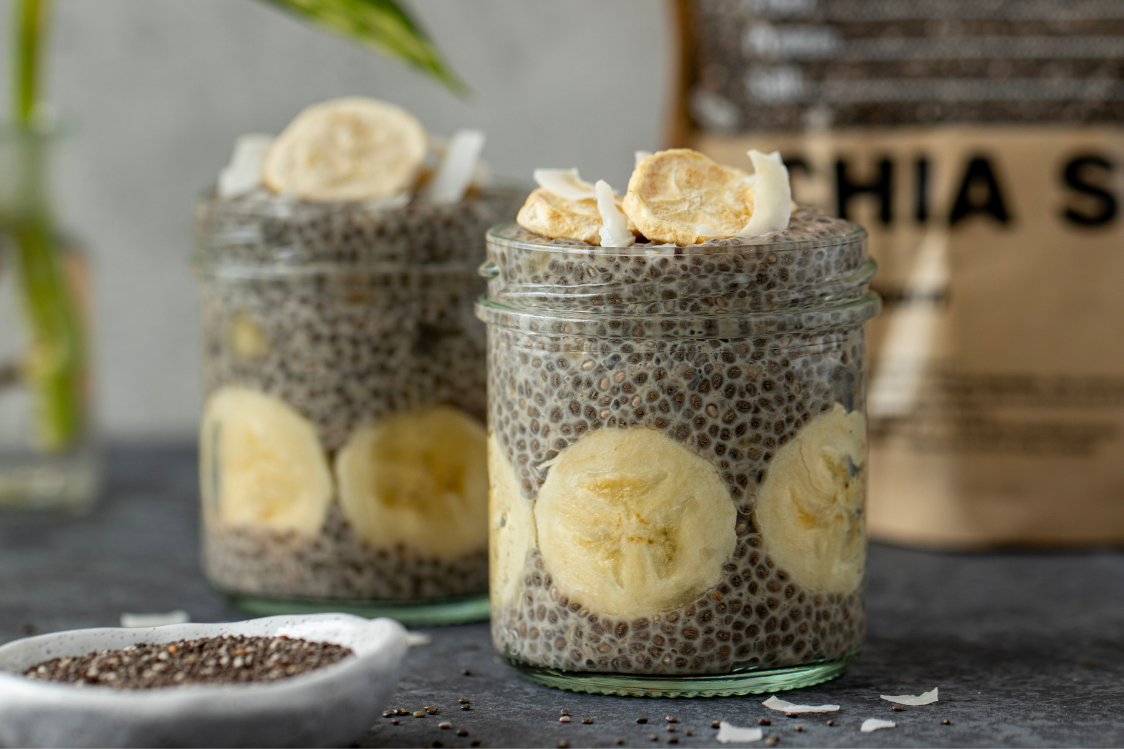
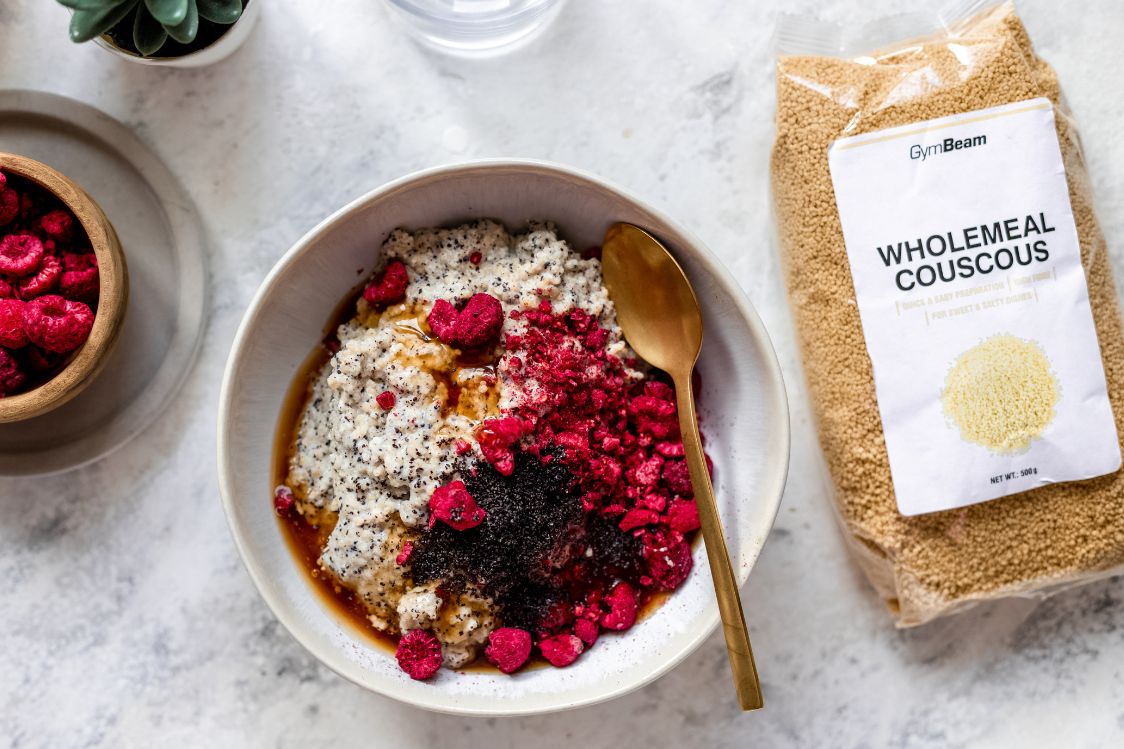
Add a comment